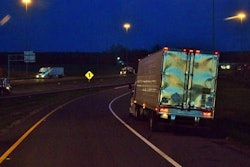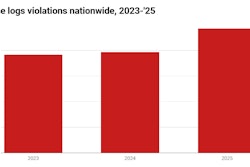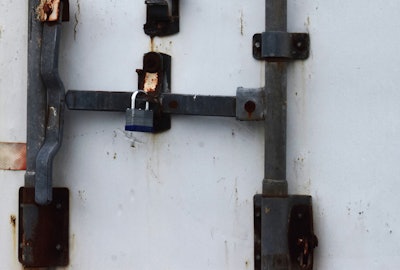
In the wee hours of Wednesday, June, 1, thieves held up a driver carrying a load of high-end athletic shoes at gunpoint as he sat staged outside a distribution center in Memphis, Tennessee. The driver was removed from the truck and forced to open the trailer, and then multiple criminals offloaded approximately 100 cases of shoes into 3 separate vehicles before fleeing into the night.
Memphis represents a known hotspot for cargo theft, with an active, multijurisdictional cargo theft task force, said Scott Cornell, Second Vice President for Travelers, overseeing the insurer's cargo theft investigations unit. Athletic sneakers, furthermore, are a known prize for criminals looking for commodities with a definite market for resale. In hindsight, the driver could have done 1,000 things differently, but hindsight isn't preparedness. There's plenty any owner-operator can do to stay safe and protect the business, and most of all yourself.
Some companies push tech solutions to crime problems, some drivers swear by the guns they carry, and often enough law enforcement encourages operators to sit tight and pick up the phone when incidents occur.
"Awareness" isn't the whole answer, but it's most of it, according to Keith Lewis, vice president of operations at CargoNet, a leading cargo theft recording firm from Verisk.

"Safety and security awareness starts when the driver begins their day," said Lewis. "We talk a lot about highway safety, but security awareness is equal. If I allow myself or vehicle to be compromised, that can be as bad as a highway tragedy."
CargoNet works a lot with fleets, which have greater interest in cameras and tech and interconnected devices, but while an owner-op might not always personally be on the line for the contents of a trailer, the broad strokes of security awareness apply to all drivers equally.
"If someone can make entry to the cab, they access the driver's or driver’s family or pets, not only the load," said Lewis, who works with the Georgia Bureau of Investigations in addition to his work at CargoNet.
To maintain your sharpness, Lewis said not to assume you're in the clear based on what you're hauling. Obviously a high-value load, like a truck full of PlayStation 5s or those high-end sneakers, should raise red flags, as well as items that are in high demand. For example, a driver might not think of baby formula as a hot commodity, but in today's market, it's rapidly become exactly that. Even common goods like paper have come into short supply two years into the pandemic, Lewis pointed out.
Cornell, speaking at the Truckload Carriers Association's Safety & Security Division meeting this week, said basic food and beverage items have become popular targets for cargo theft for more than a decade since the Great Recession. Over that time, Cornell said, criminals saw a side benefit of food and beverage pilferage or full-truckload theft. "They realized the evidence disappeared because it’s consumed," he said. Food and beverage was the No. 1 commodity category all the way through 2019.
In 2020, household goods won the top spot in the category mix, where it's remained amid the goods shortages and price hikes Lewis alluded to.
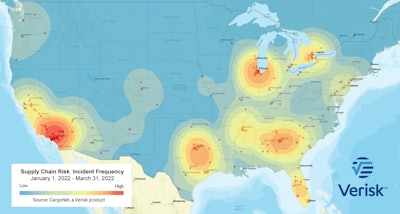 A heatmap of cargo theft activity provided by CargoNet.
A heatmap of cargo theft activity provided by CargoNet.
Whether you're hauling lumber or beer, though, tools in the prevention arsenal extend far beyond constant vigilance, CargoNet and other companies like it regularly report on cargo theft hotspots, as well as offer warnings for times and places that may see heightened activity. Mostly, the hotspots range from a lineup of usual suspects of big cities, commerce hubs and major intersections like Atlanta, Los Angeles, Chicago, Memphis, New Orleans, and so on.
[Related: Heists involving ID theft and other types of fraud a growing part of cargo-theft mix]
Beyond data, truck drivers of all stripes should rely on their instincts and colleagues, but these avenues represent double-edged swords. While Lewis encourages finding out what you can on the CB or at the coffee counter, operators should "be extremely aware of where they park the truck and what they do and don’t say," he said. Truck-stop common sense like parking in a well-lit area, backing up close to another trailer or light pole, and using a "high-value lock and not just the plastic seal," can reduce the instances of cargo theft, according to Lewis, but also look out for inside jobs, identity theft, and revealing information that could make you a target.
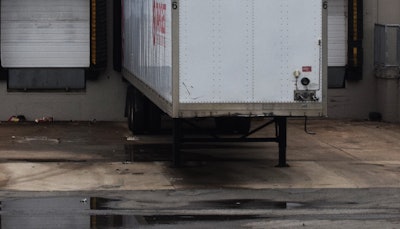 Minus a kingpin lock, a trailer dropped in the open is a sitting duck for theft by rings targeting full truckloads of goods or the equipment itself.
Minus a kingpin lock, a trailer dropped in the open is a sitting duck for theft by rings targeting full truckloads of goods or the equipment itself.
"Be careful with what you say on the CB," said Lewis. "Saying I have a load of vitamins or laptops is basically holding up a sign that says 'steal me.' Other drivers may ask you 'where'd you pick up at,''" but this too can be a sort of phishing attempt to see if you're hauling something valuable.
"If I’m talking to someone and they say they picked up in Carrolton, Georgia, there's nothing there in Carrolton, Georgia except a warehouse" that manufactures copper, Lewis added. While shippers do brand their bulk copper, if the thieves manage to melt down the ultra-valuable metal, it can be extremely difficult to trace, according to Lewis.
[Related: Cargo theft: Combating the problem with information]
Safety and security tactics that work
When it comes to avoiding theft, an old joke sheds some wisdom. "When being chased by a hungry bear, you don't have to run faster than the bear, just faster than the guy running next to you."
Lewis warned about "broken windows theory" and crimes of opportunity. Basically, if a truck looks old, in bad shape, parked in an unprotected location in a poorly maintained and graffitied truck stop lot with a phone, a wallet, and a laptop sitting on the driver's seat in the cab, it's much more likely a passerby would venture to break in.
Deterrence, not actual crimefighting, represents the bulk of a citizen's work policing his/her own life. Don't look like an easy mark. Don't make things easy on crooks. If you know you're headed into a high-crime area, maybe stop a bit short for the night.
"Go to a truck stop fuel island and see how many trucks are running? How many doors are unlocked?" said Lewis. "A lot of the police reports I’ve taken, stolen trailers and trucks were stolen from the fuel pump. We'd ask for the key and the driver didn't have it, because the truck was running with an open door."
Lewis grouped most cargo thieves into a few broad groups including organized outfits, which he said often operate on inside information and never steal a product without a buyer; local pirates, who are often families that cruise truck stops looking for easy marks; and then simple opportunists or joy riders who might slink into a driver's seat at a fuel island.
Overall, it's less important for owner-operators to focus on who might rob them than to hone in on prevention, on not getting robbed in the first place. "Once the product is taken off the back of a truck, unless there's a serial number, it's almost impossible to make a criminal case," said Lewis.
Security cameras in or around the truck can work, but too often over-the-road in the overnight hours, those cameras won't be running. Warehouses and other shipper/receiver locations often run cameras, too, but it's frequently the case that they're not actually recording or storing the data properly. That said, cameras today are cheap and plenty, so if you can devise a system that works for you, go for it.
[Related: Cargo theft activity fell a bit in 2021 but remained at high levels]
Lewis told the story of a driver who put a baby monitor in his trailer while he slept in the cab. "It's old-school technology, but the innovation is in using old-school tech to know someone’s in the back of the trailer."
Finally, if you do catch someone trying to force entry, "don’t get out and confront them. Lock the doors and call 911," he said.
While it's impossible to prove that signage works to deter crime, Lewis said a trailer with the CargoNet decal on it has never been breached. Those sizable decals are among benefits freight companies -- from one-truck owner-operators to huge fleets -- get from CargoNet membership.
"If we can slow a thief down by three minutes they’ll go somewhere else," said Lewis of safety devices and signage. "There's little things you can do to stay safe. The devil is in the details. Park the trailer, unhook it, remove one of the gladhands on the trailer. What bad guy drives around with an extra gladhand?"
If your company is the victim of a cargo theft of any size, too, Cornell urges reporting of the incident to CargoNet -- not all local law enforcement will be doing so routinely. Cornell and his investigative team follow local/regional theft trends closely with an eye out for identifying and penetrating organized rings. For more than a decade now, the team has maintained a sting trailer, an otherwise nondescript white dry van outfitted with interior cameras and other recording devices and loaned "five or six times a year" to various enforcement jurisdictions around the country, he said, at no cost to the jurisdiction.
He told the story of a big bust that started when his team and law enforcement officials identified a series of thefts along I-40 in the Southwest, and the sting trailer was deployed. After some trial and error, cargo was stolen from the trailer and eventually tracked to a pole barn on a property in rural Michigan. Representing one of the "biggest cases we ever worked," Cornell said, the barn upon entry "looked like a Home Depot," with merchandise of all sorts stacked high, cash "money buried in PVC pipes on the property" and more. "We delivered pizza to law enforcement there for two weeks."
It wasn't principally full-truckload theft, either, in this case, but pilferage from loaded trailers. Any small thing you can do to deter such thieves could pay big dividends. --Todd Dills contributed to this report.
Next in this two-part feature: An owner-operator's best defense against criminals: Firearms or phone?



